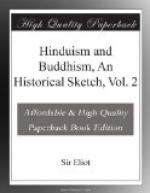Santideva’s Bodhisattva, when conceiving the thought of Bodhi or eventual supreme enlightenment to be obtained, it may be, only after numberless births, feels first a sympathetic joy in the good actions of all living beings. He addresses to the Buddhas a prayer which is not a mere act of commemoration, but a request to preach the law and to defer their entrance into Nirvana. He then makes over to others whatever merit he may possess or acquire and offers himself and all his possessions, moral and material, as a sacrifice for the salvation of all beings. This on the one hand does not much exceed the limits of danam or the virtue of giving as practised by Sakyamuni in previous births according to the Pali scriptures, but on the other it contains in embryo the doctrine of vicarious merit and salvation through a saviour. The older tradition admits that the future Buddha (e.g. in the Vessantara birth-story) gives all that is asked from him including life, wife and children. To consider the surrender and transfer of merit (pattidana in Pali) as parallel is a natural though perhaps false analogy. But the transfer of Karma is not altogether foreign to Brahmanic thought, for it is held that a wife may share in her husband’s Karma nor is it wholly unknown to Sinhalese Buddhism.[11] After thus deliberately rejecting all personal success and selfish aims, the neophyte makes a vow (pranidhana) to acquire enlightenment for the good of all beings and not to swerve from the rules of life and faith requisite for this end. He is then a “son of Buddha,” a phrase which is merely a natural metaphor for saying that he is one of the household of faith[12] but still paves the way to later ideas which make the celestial Bodhisattva an emanation or spiritual son of a celestial Buddha.
Asanga gives[13] a more technical and scholastic description of the ten bhumis or stages which mark the Bodhisattva’s progress towards complete enlightenment and culminate in a phase bearing the remarkable but ancient name of Dharmamegha known also to the Yoga philosophy. The other stages are called: mudita (joyful): vimala (immaculate): prabhakari (light giving): arcismati (radiant): durjaya (hard to gain): abhimukhi (facing, because it faces both transmigration and Nirvana): duramgama (far-going): acala (immovable): sadhumati (good minded).




